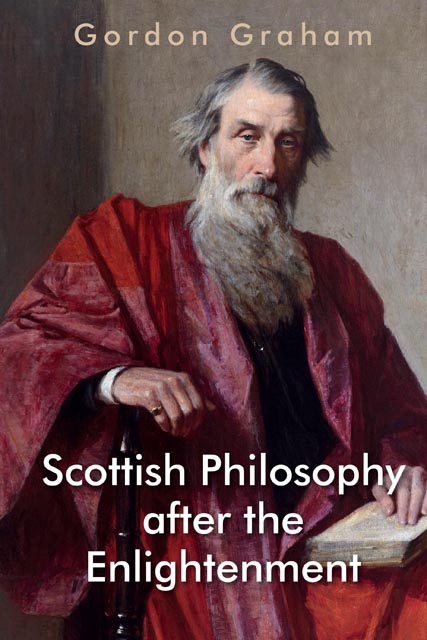Book contents
- Frontmatter
- Contents
- Preface and Acknowledgements
- Series Editor’s Introduction
- A Note on Women in Scottish Philosophy: Mrs Oliphant
- A Chronology of Scottish Philosophy after the Enlightenment
- 1 An Autobiographical Prologue
- 2 Sir William Hamilton and the Revitalisation of Scottish Philosophy
- 3 James Frederick Ferrier and the Course of Scottish Philosophy
- 4 Psychology and Moral Philosophy: Alexander Bain
- 5 Thomas Carlyle and the Philosophy of Rhetoric
- 6 Hegelianism and its Critics
- 7 Scottish Philosophy’s Progress
- 8 Religion, Evolution and Scottish Philosophy
- 9 The Gifford Lectures and the Re-affirmation of Theism: Alexander Campbell Fraser
- 10 The Culmination of Scottish Philosophy: A. S. Pringle-Pattison
- 11 John Macmurray and the Self as Agent
- Bibliography
- Index
Series Editor’s Introduction
Published online by Cambridge University Press: 07 June 2023
- Frontmatter
- Contents
- Preface and Acknowledgements
- Series Editor’s Introduction
- A Note on Women in Scottish Philosophy: Mrs Oliphant
- A Chronology of Scottish Philosophy after the Enlightenment
- 1 An Autobiographical Prologue
- 2 Sir William Hamilton and the Revitalisation of Scottish Philosophy
- 3 James Frederick Ferrier and the Course of Scottish Philosophy
- 4 Psychology and Moral Philosophy: Alexander Bain
- 5 Thomas Carlyle and the Philosophy of Rhetoric
- 6 Hegelianism and its Critics
- 7 Scottish Philosophy’s Progress
- 8 Religion, Evolution and Scottish Philosophy
- 9 The Gifford Lectures and the Re-affirmation of Theism: Alexander Campbell Fraser
- 10 The Culmination of Scottish Philosophy: A. S. Pringle-Pattison
- 11 John Macmurray and the Self as Agent
- Bibliography
- Index
Summary
Philosophy has been taught and written in Scotland since the fifteenth century. The purpose of this series is to publish new scholarly work on any and every aspect of the history of Scottish philosophising, from John Mair to John Macmurray. Scotland’s most celebrated philosophical achievements remain those produced by Hume, Smith, Reid and their contemporaries in the eighteenth century. It is, however, no longer possible to believe that the Scottish Enlightenment had no indigenous roots. Nor is it possible to believe that there was no significant philosophy produced in Scotland once the Enlightenment was over.
There is no single set of intellectual concerns distinctive of and unique to philosophy as it has been taught and written in Scotland. Historical study of Scottish philosophy must be, to a significant extent, study of the changing nature of philosophy itself. It should be open to the idea that the preoccupations and methods of philosophers today may not be those of philosophers in the past. It should also concern itself with philosophical connections and intellectual affinities between Scotland, England, Ireland and the rest of Europe, and, where appropriate, between Scotland and America.
James Harris
- Type
- Chapter
- Information
- Scottish Philosophy after the Enlightenment , pp. viiiPublisher: Edinburgh University PressPrint publication year: 2022

